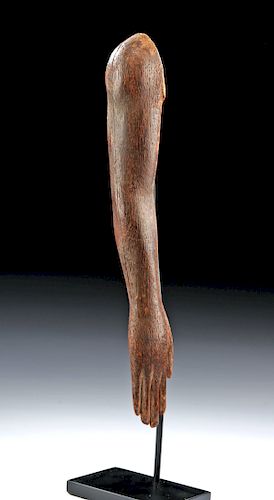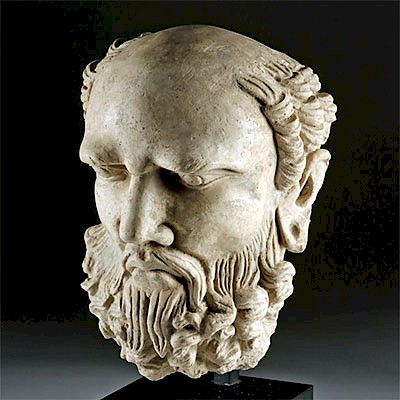Egyptian Wood Right Arm of Statue - Art Loss Registered
Lot 5
About Seller
Artemis Fine Arts
686 S Taylor Ave, Ste 106
Louisville, CO 80027
United States
Selling antiquities, ancient and ethnographic art online since 1993, Artemis Gallery specializes in Classical Antiquities (Egyptian, Greek, Roman, Near Eastern), Asian, Pre-Columbian, African / Tribal / Oceanographic art. Our extensive inventory includes pottery, stone, metal, wood, glass and textil...Read more
Categories
Estimate:
$3,000 - $4,500
Absentee vs Live bid
Two ways to bid:
- Leave a max absentee bid and the platform will bid on your behalf up to your maximum bid during the live auction.
- Bid live during the auction and your bids will be submitted real-time to the auctioneer.
Bid Increments
| Price | Bid Increment |
|---|---|
| $0 | $25 |
| $300 | $50 |
| $1,000 | $100 |
| $2,000 | $250 |
| $5,000 | $500 |
| $10,000 | $1,000 |
| $20,000 | $2,500 |
| $50,000 | $5,000 |
| $100,000 | $10,000 |
| $200,000 | $20,000 |
About Auction
By Artemis Fine Arts
Jan 16, 2020
Set Reminder
2020-01-16 10:00:00
2020-01-16 10:00:00
America/New_York
Bidsquare
Bidsquare : Ancient | Asian | Ethnographic
https://www.bidsquare.com/auctions/artemis-gallery/ancient-asian-ethnographic-4799
Featuring classical antiquities, ancient and ethnographic art from cultures encompassing the globe. Artemis Fine Arts info@artemisgallery.com
Featuring classical antiquities, ancient and ethnographic art from cultures encompassing the globe. Artemis Fine Arts info@artemisgallery.com
- Lot Description
Egypt, Middle Kingdom, ca. 2055 to 1760 BCE. A petite hand-carved wooden right arm from a statue, with the hand and fingers fully extended, finely detailed with each finger and nailbed well delineated. The sculptor also incised palm lines on the hand. Though the arm was rendered with naturalistic contours, it presents a rigid pose characteristic of ancient Egyptian figures. Size: 7.125" H (18.1 cm); 8.5" H (21.6 cm) on included custom stand.
The fine grain of the wood suggests that this piece was carved from cedar. Interestingly, cedar wood was not native to Egypt. Egypt did not have verdant forests filled with tall trees, and unfortunately most of its native lumber was of relatively poor quality. Thus, they relied on importing to acquire hardwoods - ebony imported from Africa, cedar and pine from Lebanon. One fabulous obelisk inscription by Thutmose III attests to the luxury of treasured hardwoods. It reads as follows, "They brought to me the choicest products …consisting of cedar, juniper and of meru wood … all the good sweet woods of God's Land." The rarity of cedar meant that figures like this statue to which this arm belonged were reserved for those who could afford them.
Accompanied by copy of Art Loss Register certificate number S00106037.
Provenance: private Connecticut, USA collection; private European collection, 1986-2015; UK art market, 2015. Accompanied by copy of Art Loss Register certificate number S00106037.
All items legal to buy/sell under U.S. Statute covering cultural patrimony Code 2600, CHAPTER 14, and are guaranteed to be as described or your money back.
A Certificate of Authenticity will accompany all winning bids.
We ship worldwide and handle all shipping in-house for your convenience.
#149803Age cracks as shown. Old repair to upper interior side of arm. Old nicks to tips of fingers. Otherwise the fingers and hand are in excellent condition. Wood has developed a wonderful lustrous patina.Condition
- Shipping Info
-
All shipping is handled in-house for your convenience. Your invoice from Artemis Gallery will include shipping calculation instructions. If in doubt, please inquire BEFORE bidding for estimated shipping costs for individual items.
-
- Buyer's Premium



 EUR
EUR CAD
CAD AUD
AUD GBP
GBP MXN
MXN HKD
HKD CNY
CNY MYR
MYR SEK
SEK SGD
SGD CHF
CHF THB
THB















